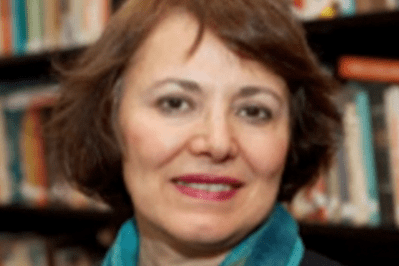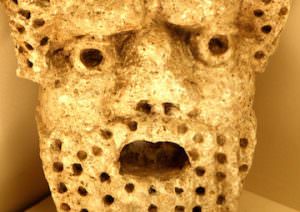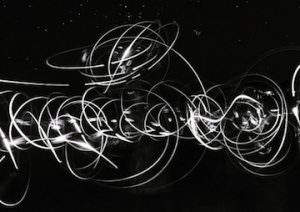Truthdigger of the Week: Homa Hoodfar, Expert on the World’s Muslim Women, Imprisoned in Iran
Iran’s Revolutionary Guard detained the dual Canadian-Iranian citizen for allegedly fostering a “soft feminist revolution” and are denying her her rights and even medical treatment.Iran’s Revolutionary Guard detained the Canadian-Iranian dual citizen for allegedly fostering a “soft feminist revolution” and are denying her her rights and even medical treatment. 1
2
1
2
Every week the Truthdig editorial staff selects a Truthdigger of the Week, a group or person worthy of recognition for speaking truth to power, breaking the story or blowing the whistle. It is not a lifetime achievement award. Rather, we’re looking for newsmakers whose actions in a given week are worth celebrating.
Editor’s note: The video still photo above shows a relative of Homa Hoodfar being interviewed.
Homa Hoodfar, an Iranian-Canadian dual citizen and a renowned scholar at Concordia University in Montreal, was detained June 6 in Iran after a personal visit to her birth country during which several months of interrogations had delayed her trip back to Canada, where she lives.
As an anthropologist, much of her research over the past several decades has centered on the daily lives of Muslim women in various countries, in both the East and the West, and has shed a different light on women who are often misrepresented, even in academic work. Her books include a volume of portrayals of low-income families in Egypt, a comparative analysis of the impact of gender quotas in eight countries in various regions of the globe, and a comprehensive examination of the rise of the hijab in North America. She has also examined the politicization of sports that exclude Muslim women from participation.
Taken as a whole, her academic research is not in any way “seditious,” as her family members remind the media, but rather an intimate look at the roles Muslim women play in societies around the world. A religious woman herself, she was able to gain insight and access into the lives of women who practice Islam in different contexts in a way that other scholars with a less intimate understanding of the religion were not always able to.
And though she has written articles on Iran, the country where she was born was in no way the focus of her academic research. Although her reasons to visit Iran this year were entirely personal, she conducted some archival research while there. More importantly, however, her visit coincided with the Iranian elections in which the most women in the history of the country were voted into government positions.
Perhaps therein lies the key to her abrupt, unfounded detainment. The election marked a further shift toward the reformist policies championed by President Hassan Rouhani, since the 14 women elected in March are all reformists themselves. Many religious hardliners in the country, including the Ayatollah Ali Khamenei, Iran’s supreme leader, have not welcomed the move toward reform; and while more progressive-minded leaders are increasingly gaining power within government, there is a strong divide in the nation because Khamenei still controls the national broadcast media as well as the armed forces, including the Revolutionary Guard that detained Hoodfar.
As her fellow scholar Ziba Mir-Hosseini wrote, “Homa has become a pawn in a power struggle between Iran’s hardliners and moderates.”
“There is a battle for the soul of the nation,” Mir-Hosseini continued, and one of the tactics of hardliners seems to be to arrest dual citizens without recognizing their other citizenship: Unfortunately, Hoodfar was not the first or the last dual citizen arrested in recent months by the Revolutionary Guard.
The 65-year-old professor has been held in Iran’s Evin Prison for over a month and has not had access to her lawyer or her family, who are worried about Hoodfar’s health because she has a neurological disease that requires medication.
The charges against her were concealed until it was recently revealed that she was being charged with promoting a “soft feminist revolution.” Amnesty International said the academic is a “prisoner of conscience,” and over 5,000 people, including renowned linguist Noam Chomsky, have signed a petition demanding Hoodfar’s release. The petition describes her “grueling” treatment and makes a case for the scholar to be allowed to return to her home in Canada.
SUPPORT TRUTHDIG
In early March just before her scheduled departure from Iran, the Counter Intelligence Unit of the Iranian Revolutionary Guard raided Prof. Hoodfar’s residence, and confiscated her personal computer, phone, and passports. After summoning her for several long interrogations, just before the Iranian New Year they released her on bail but denied her the right to leave the country. Since then, Prof. Hoodfar has been subject to more than ten grueling interrogations without the presence of a lawyer. Her academic research seems to have been interpreted as a threat to national security on the basis of her comparative research on women’s status, development, and the family in different Muslim contexts. After she was called for yet another interrogation on Monday, June 6th, she was incarcerated at the notorious Evin prison in Tehran.Your support matters…
Independent journalism is under threat and overshadowed by heavily funded mainstream media.
You can help level the playing field. Become a member.
Your tax-deductible contribution keeps us digging beneath the headlines to give you thought-provoking, investigative reporting and analysis that unearths what's really happening- without compromise.
Give today to support our courageous, independent journalists.






You need to be a supporter to comment.
There are currently no responses to this article.
Be the first to respond.